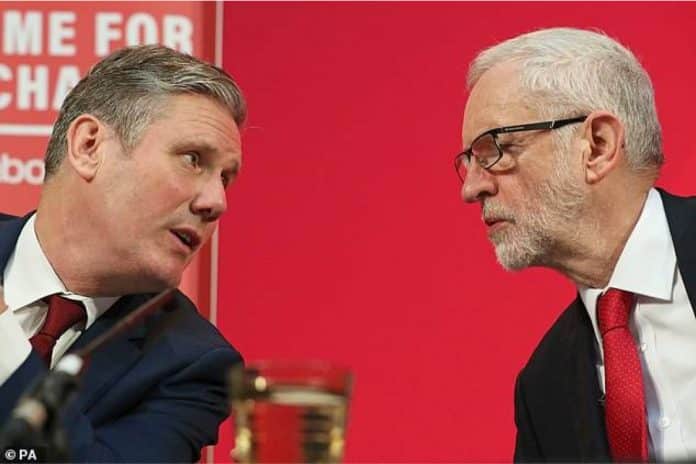The Labour Party, under Keir Starmer’s leadership, is facing its lowest-ever approval rating, with a net figure of -54%. A mere 14% of the public approve of his leadership, while 68% disapprove, according to YouGov polling from 31 March 2025. This dramatic drop in support is widely attributed to the unpopular policy decisions made under Starmer’s centrist administration, which are perceived to disproportionately harm the poorest in society. Many critics argue that had Jeremy Corbyn’s progressive policies been enacted, the current economic crisis could have been mitigated.
Harsher Eligibility for Disability Benefits
One of the most controversial moves by Starmer’s government has been tightening eligibility for disability benefits. The new rules make it significantly harder for disabled individuals to access support, forcing many to undergo repeated and stringent reassessments. These measures mirror the Conservative policies that Corbyn’s Labour once fought against, policies which led to thousands of people being declared ‘fit to work’ despite severe disabilities, many associated with mental health. Under Starmer, many disabled people will seen their financial aid slashed, pushing them further into poverty. This has been seen as a betrayal of Labour’s traditional values of social justice and compassion.
Under Corbyn’s leadership, Labour had pledged to scrap punitive assessments, remove private sector involvement in disability welfare assessments, and introduce a more humane system that trusted medical professionals’ judgements. Corbyn’s policies aimed to expand, rather than restrict, support for disabled people, ensuring that they had the dignity and resources to live independently.
Failure to Support Households Amid Soaring Utility Bills
Another area of public discontent is Starmer’s failure to provide sufficient support to households facing the steepest rise in utility bills in decades. Instead of intervening to regulate energy prices or expanding subsidies for struggling families, the government has allowed bills to skyrocket while offering only limited relief. This approach leaves millions making difficult choices, exacerbating the cost-of-living crisis and increasing personal debt.
In contrast, Corbyn’s Labour manifesto in 2019 proposed renationalising the energy sector, ensuring that profits were reinvested into reducing bills rather than lining the pockets of shareholders. Corbyn also promised a publicly owned and controlled National Energy Agency to oversee fair pricing, an approach that would have prevented the current crisis from spiralling out of control. By failing to implement such measures, Starmer’s government is perceived as prioritising corporate interests over the needs of ordinary people.
Public Services and Austerity-Driven Cuts
Starmer’s administration has also been criticised for continuing austerity-driven policies in public services. The NHS remains underfunded and overstretched, with nurses, doctors, and paramedics facing burnout and low wages. Similarly, funding cuts to local councils have resulted in reduced social care services, library closures, and weakened support for vulnerable populations.
In contrast, Corbyn’s Labour promised an ambitious plan to reverse austerity. His manifesto outlined a radical increase in NHS funding, a commitment to scrap tuition fees, and an investment in local government to ensure well-funded social services. Corbyn also pushed for a Green New Deal, which would have created thousands of jobs in renewable energy while tackling climate change.
Housing Crisis and Rent Controls
Starmer’s government has done little to tackle the growing housing crisis. Rents continue to rise unchecked, and affordable housing is scarce. The lack of rent controls and insufficient investment in social housing have left thousands of families on the brink of homelessness.
Corbyn, on the other hand, had pledged to implement nationwide rent controls, massively expand social housing, and regulate the private rental market to prevent exploitative landlords from charging extortionate rates. This policy would have provided long-term housing security for millions.
Transport and Nationalisation
Starmer’s government has also abandoned Labour’s previous commitment to nationalise key industries such as rail, mail, and water. Instead, these services remain in private hands, with fares and prices continuing to rise.
Corbyn’s Labour had proposed bringing railways back under public control, eliminating profiteering in public transport, and ensuring fair and affordable fares for commuters. This would have significantly improved accessibility and affordability for millions who rely on public transport daily.
A Centrist Approach That Fails the Public
The stark contrast between Corbyn’s bold, transformative policies and Starmer’s centrist, neoliberal approach has become increasingly apparent. Starmer’s decision to move Labour away from its socialist principles has alienated large sections of the working class and disillusioned those who once saw Labour as a force for positive change. While Corbyn sought to create a fairer society through wealth redistribution, public ownership, and enhanced welfare protections, Starmer’s Labour is perceived as merely managing the status quo rather than challenging it.
The result? On the one hand, a historically low approval rating, growing dissatisfaction among voters, and a resurgence of calls for a return to a more progressive Labour Party that genuinely prioritises the needs of the people over corporate interests. On the other hand, many are mistakenly seeking solutions in populist promises made by parties like Reform UK. Had Corbyn’s policies been implemented, the country might have faced a very different reality: one where the most vulnerable were protected rather than punished.
Jeremy Corbyn’s Response:







